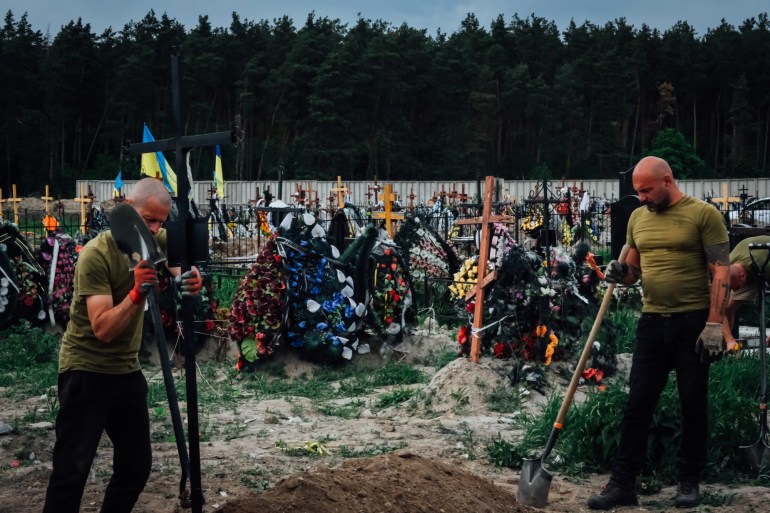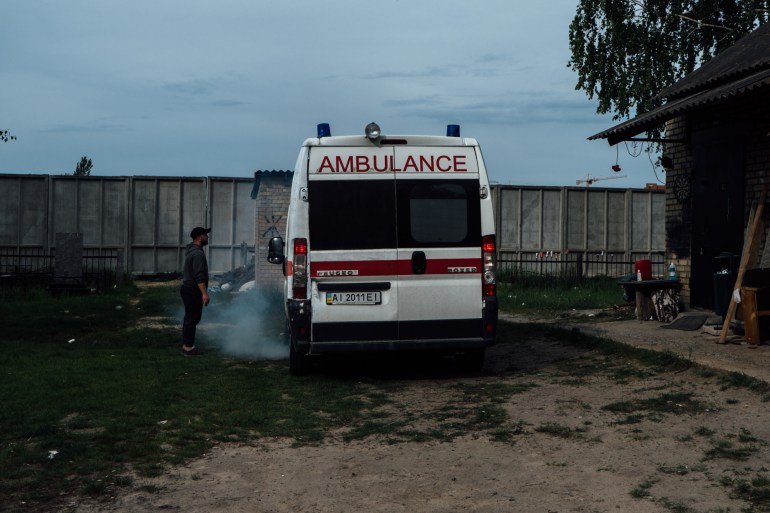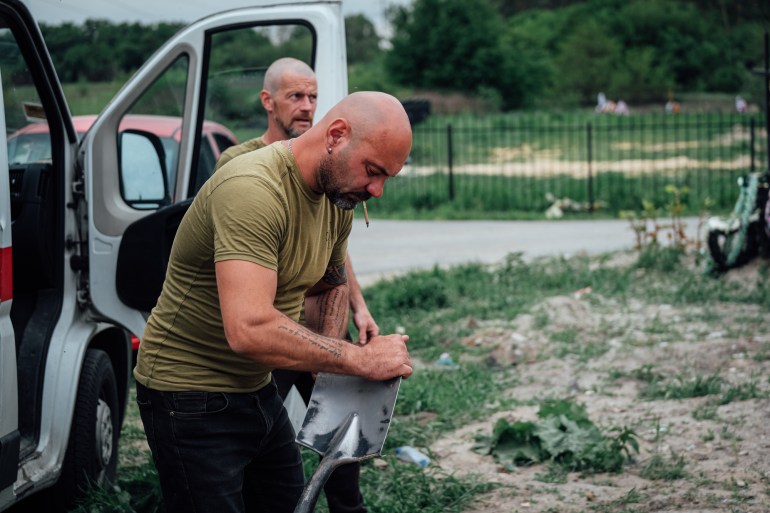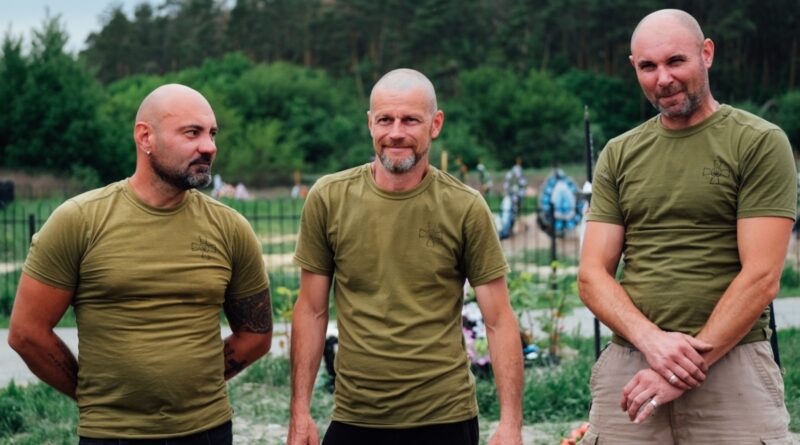An unexpected friendship: The gravediggers of Bucha
Bucha, Ukraine – Vlad Minchenko, a stocky, straight-talking 44-year-old tattoo artist turned gravedigger, knows a thing or two about being under pressure.
As he shovels dry, dusty earth in the gentle light of dusk, he recounts tales of the violent interrogations, heavy shelling and wanton destruction he survived during more than a month under Russian occupation.
In such high-pressure situations “it’s important to have people you trust around you,” says Minchenko as he motions with a tilt of his head towards Sergiy Matuk, a towering, gruff 43-year-old retired footballer and Artem Myhaylov, a quiet, wiry 44-year-old former pizza chef and part-time construction worker, both of whom are now volunteer gravediggers.
The two men scoop up the soil to a steady rhythm, perfectly synchronised as they fill a carefully dug grave. It’s physically demanding work, but the men barely break a sweat.
It is late May and the trio is repairing an old grave at the cemetery in Bucha, a city roughly 25km (16 miles) northwest of Kyiv that was damaged by shelling during the weeks-long occupation of the areas surrounding the capital after Russia launched a full-scale invasion of Ukraine on February 24. The existing iron cross had been destroyed and several layers of soil displaced. Matuk, who is in charge of the group, respectfully skirts around the perimeter of the grave to make sure the repairs are going to plan. He pats down some protruding soil, before picking up his shovel and resuming his work.
The gentle thud of shovels and spades hitting the dry earth fills the cemetery, which is encircled by a strip of lush green forest. As the gravediggers take a short break, an eerie silence fills the air, only to be broken by the croak of a raven that has landed on one of the tombstones. The graveyard is empty bar two elderly mourners who stand hunched over a grave in the distance.
Matuk thrusts his shovel into the ground and leans on it as he lights a cigarette. The men begin to poke fun at each other, but underneath the playful bravado lies a level of familiarity and trust usually only seen among old friends.
The three men, however, met just a few months ago, one morning in early March, when they had rushed to put out a series of fires caused by Russian troops as they re-entered Bucha, having been pushed back in the early days of the war.

Battling an inferno
Matuk places his hands over the handle of the shovel as he recalls chaotic scenes with many cars ablaze near the city’s town hall. “I just saw all the smoke and ran there; we all have our duty, someone had to do it, so we did,” he says.
Minchenko, who has a large tattoo of a crucifix on one of his forearms, cannot pinpoint the moment the three men met as they battled to control the inferno that threatened to spread to the nearby buildings and destroy more of his beloved city.
However, he can recall jumping in Matuk’s car and driving around trying to collect any liquids they could get their hands on, including bottles of Coca-Cola from local stores.
The fires eventually died out, but Russian soldiers were swarming the area, and the danger was far from over. The three men had seen in each other an ability to remain calm and support one another in a critical situation, so they agreed to meet at the same location two days later when they would discuss how they could be of use during their city’s occupation.
According to Matuk, as he tried to drive home, Russian troops abducted him, placing a bag over his head, tying his hands with tape, and taking him to an unknown location. After initially managing to break free, the soldiers grew more aggressive, tying his whole body to a chair “like a mummy”. Matuk says they interrogated him for roughly 24 hours about any potential links to the military before smashing his phone to pieces and letting him go.
It’s an experience Minchenko had been through a few days earlier when about 10 Russian troops stormed his friend’s home where he was staying, ordering him to remove his clothes and get on his knees.
His friend was a member of the Ukrainian military forces and had left his keys with Minchenko when he left to fight during the early days of the war. “They didn’t knock on the door; they just smashed it down. They must have had lists of soldiers’ addresses,” he says. The soldiers scoured his multiple tattoos for any “nationalistic” symbols, he says.
He recalls that they hit him as they interrogated him and that one of them, who Minchenko says was Chechen, was particularly aggressive and told the others they should shoot him dead. However, another soldier who Minchenko said was “much calmer” found documents showing the apartment didn’t belong to him and persuaded the rest to leave him alone.
But, says Matuk with a mischievous grin, the soldiers had missed a trick. Just a few days after Russia invaded Ukraine on February 24, he says Minchenko had notified local authorities about the position of a long column of Russian vehicles near his home, which the Ukrainian army later destroyed.
‘This job connects us’
Matuk had worked a number of odd jobs since he retired from football in his thirties and had been employed as a gravedigger for six months before Russian forces entered the regions surrounding Kyiv. Now, with an increased workload, he needed people with the psychological and physical tenacity to take on such a task.
So, when the men met again Matuk asked if Myhaylov and Minchenko wanted to join him in collecting the bodies lying on the streets of Bucha and help bury them.
Minchenko says that he and Myhaylov understood that it was “a job that needed to be done” so they agreed. However, with no previous experience, they had wrongly assumed Matuk would show them the basics. Minchenko breaks into a wry smile as he recalls what Matuk said to them on the first day. “Here is a shovel, now go dig a grave.”
Minchenko recalls how the sound of shelling filled the air as they worked. Between the surging adrenaline and anger he felt, he says he barely registered the weight of the dead people he carried. “Everybody is shouting, bombs are dropping; you don’t even feel your own body,” he explains.
Many of the bodies were in terrible condition, and he admits they would often vomit from the smell. He recalls his most difficult burial. “It was a woman who weighed around 150 kilograms [330 pounds] and had been found in her yard; she was naked, and her flesh had been completely burnt; the smell was very strong,” he says.
Myhaylov recalls bodies with bullet wounds, “without hands,” and some which had been “beaten with a hard object”. He briefly falls silent, before shaking his head and getting back on with his work.

Morning to night
The three men would work from morning to night during the occupation. They say Russian troops would let them travel back and forth to the cemetery, but when the fighting was too intense for them to reach it, they would sometimes resort to burying bodies in a mass grave in the garden by the golden-domed St Andrew’s Church in the centre of Bucha.
The Russian forces have since retreated from the area and the sound of artillery fire has been replaced with the sounds of nature, but their days are still long.
They always work in a team, weaving past each other with ease and demonstrating remarkable efficiency in their work. The three men also look the part – in the green Ukrainian military T-shirts made famous by the country’s president, Volodymyr Zelenskyy, during his many television addresses. They are the only gravediggers assigned to the Bucha cemetery and by the time the sun starts to set, they are all alone.
Matuk explains that he had recorded more than 200 burials during the occupation in a logbook which, he says, was taken by Russian troops when they withdrew from the area at the end of March.
More than 10 mass graves and more than 1,000 bodies have been uncovered in the Kyiv region since the war began. After the Russian withdrawal, volunteer gravediggers like Minchenko and Myhaylov have also been tasked with exhuming bodies so that the Kyiv police and international forensic teams can examine them for potential war crimes.
The two men put the finishing touches to the repaired grave, patting the topsoil with the tips of their shovels. Myhaylov lifts an ornate cross into the air before driving the pointed base into the freshly dug soil.

‘This job connects us’
It is eight in the evening as they end their shift. Minchenko walks over to an old ambulance they have converted into a makeshift hearse. He reaches into the vehicle and pulls out three beers, slams the bottle caps off using the tip of his shovel, and hands two of them to his colleagues.
He then pulls out an ornate plaque and a toolbox before sitting at a small table in a fenced-off plot of land surrounded by rows of tombstones. His tattooing skills are put to use as he engraves the deceased’s name on the plaque. He says that he will eventually return to his old profession, but with a shrug of his shoulders, he concedes that “I doubt life will be the same again.”
Matuk and Myhaylov respectfully circle the repaired grave, making sure everything is tidy before taking a swig of their cold beers. Minchenko believes their shared experience in the graveyard has created a strong loyalty among the three men. “This job connects us; if one of us calls and makes a request, we don’t ask questions. We just do it,” he says.
Myhaylov says their work together has allowed them to fast-track the many stages necessary to build a long-lasting friendship. “I would say they are both like my brothers now.”
This article is part of a new series, Unexpected Friendships, telling the stories of the friendships forged in unlikely circumstances.

